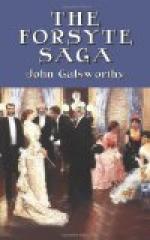Soames turned from the vault and faced toward the breeze. The air up here would be delicious if only he could rid his nerves of the feeling that mortality was in it. He gazed restlessly at the crosses and the urns, the angels, the “immortelles,” the flowers, gaudy or withering; and suddenly he noticed a spot which seemed so different from anything else up there that he was obliged to walk the few necessary yards and look at it. A sober corner, with a massive queer-shaped cross of grey rough-hewn granite, guarded by four dark yew-trees. The spot was free from the pressure of the other graves, having a little box-hedged garden on the far side, and in front a goldening birch-tree. This oasis in the desert of conventional graves appealed to the aesthetic sense of Soames, and he sat down there in the sunshine. Through those trembling gold birch leaves he gazed out at London, and yielded to the waves of memory. He thought of Irene in Montpellier Square, when her hair was rusty-golden and her white shoulders his—Irene, the prize of his love-passion, resistant to his ownership. He saw Bosinney’s body lying in that white mortuary, and Irene sitting on the sofa looking at space with the eyes of a dying bird. Again he thought of her by the little green Niobe in the Bois de Boulogne, once more rejecting him. His fancy took him on beside his drifting river on the November day when Fleur was to be born, took him to the dead leaves floating on the green-tinged water and the snake-headed weed for ever swaying and nosing, sinuous, blind, tethered. And on again to the window opened to the cold starry night above Hyde Park, with his father lying dead. His fancy darted to that picture of “the future town,” to that boy’s and Fleur’s first meeting; to the bluish trail of Prosper Profond’s cigar, and Fleur in the window pointing down to where the fellow prowled. To the sight of Irene and that dead fellow sitting side by side in the stand at Lord’s. To her and that boy at Robin Hill. To the sofa, where Fleur lay crushed up in the corner; to her lips pressed into his cheek, and her farewell “Daddy.” And suddenly he saw again Irene’s grey-gloved hand waving its last gesture of release.
He sat there a long time dreaming his career, faithful to the scut of his possessive instinct, warming himself even with its failures.
“To Let”—the Forsyte age and way of life, when a man owned his soul, his investments, and his woman, without check or question. And now the State had, or would have, his investments, his woman had herself, and God knew who had his soul. “To Let”—that sane and simple creed!




